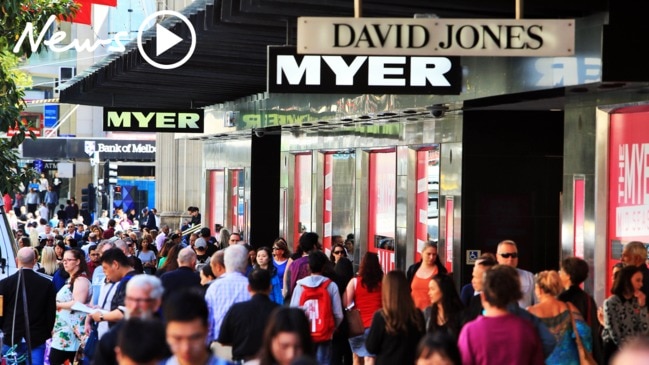Department stores can no longer blame online for their woes
If major retailers like David Jones want to continue in an increasingly tough market they should take responsibility for their failing, rather than falling back on a convenient lie, writes Ingrid Maynard.

As David Jones closes the doors of its iconic menswear store in the Bourke Street Mall, with the troubles facing the retail sector, are we are looking at the End of Days for our retail giants?
With every profit downgrade, the future of Myer looks dire, while Kmart, BIG W and Target are also struggling.
Retailers and many supportive commentators have laid the blame for this dark time of retailing on a change in consumer behaviour, with one in five Aussies today having purchased a product online.
And while there’s no question the ease and convenience of online shopping has played a role in the retail downturn in Australia, our retailers should share some responsibility for the predicament they currently face.
RELATED: David Jones to close menswear store in Melbourne’s Bourke St Mall
Online shopping did not sneak up upon us. It has been growing for over a decade, yet Australia’s major retailers have done little to attempt to combat its rise.
Instead of focusing on making a trip to their store experiential, retailers responded by slashing staff and cutting training programs.

It’s something we have all noticed as we stand in a store looking for assistance, frustrated customers often abandoning their purchases after minutes of waiting.
I recently visited a Myer store and felt as though I had been transported back in time to when bargain basement shopping was the expectation. The ambience supported it — dark and dingy, with lights out in parts and flickering in others.
This was a CBD Myer store with premium price clothing brands racked without any stories or signage. Yet as I stumbled over the tumbleweeds that had replaced shoppers, I realised there were no staff anywhere to be found, as the overhead sign directing me to self-service confirmed.
Instead of blaming online and pointing the finger at their customers for the retail slump, I think that it is time our largest retailers took some responsibility and had a look down memory lane at when their demise started.
MORE FROM RENDEZVIEW: When influencers are actually advertisers
The late 1990s was the start of retailers training customers to wait for sales, first Boxing Day, then mid-year, then mid-season.
Then it was time to cut back on staff and stop refitting stores, with the theory being that any ‘excess’ expenditure on creating an ‘experience’ for the customer would upset the only customer that senior management was concerned about — their shareholders.
What major retailers need to discover is that sustainable profit is to be achieved by increasing sales, created through improved store layouts, formats, quality advice, service and effective loyalty programs. It’s about investing in the experience of the customer and having a vision that places the customer first, not cost cutting.

This customer experience is about going into a store to feel special by being in an environment that inspires, while being guided by experts.
Instead, retailers have chosen to stay the same, stocking brands that customers can easily find online at a cheaper cost and then provide none of the specialised service.
It’s little wonder consumers are turning their backs on the major retailers, preferring to shop online or at a speciality store which does offer something different.
RELATED: Myer back in black as online sales, store shake-up help bottom line
Bricks and mortar retailers take heed: yes, you’ve been hit with a lump of 4x2, but you can avoid the Mack truck that is coming your way.
Hire more people and train them to serve customers in a way that makes them feel special and connected to your brand.
Invest in yourself by creating an experience in store with products that are unique and technology that connects online with offline, encouraging shoppers into store to pick up goods by adding real value and service.
Work your backsides off so your customers become your brand ambassadors, your influencers, encouraging more and more to head to your store.
Fail to do so and maybe one day there will be a vintage store in the CBD, a museum of sorts, where parents take their children to show them how they used to shop.
Ingrid Maynard is the director of The Sales Doctor.


